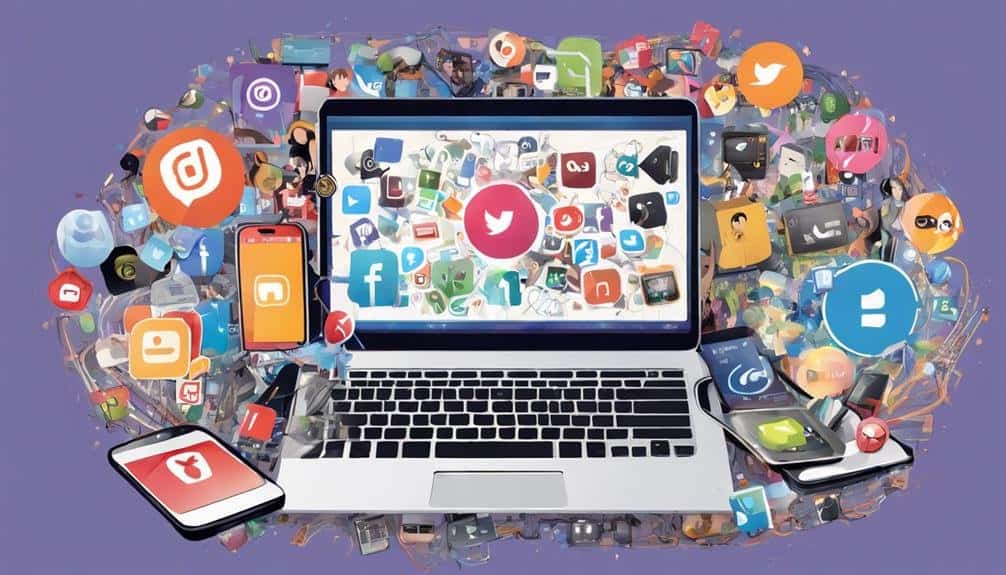What Is Digital Literacy?
Imagine you come across an article online about a new investment opportunity, and you need to determine its legitimacy. How do you sift through the information presented and make an informed decision?
Understanding digital literacy is vital in piloting such scenarios and many others in today's tech-driven world. Digital literacy encompasses a range of skills that go beyond basic computer knowledge.
It involves critically evaluating information, safeguarding your online presence, and effectively communicating in the digital domain. But what exactly does it entail, and why is it increasingly important in our daily lives?
Key Takeaways
- Digital literacy enhances communication and critical thinking skills in today's interconnected world.
- Proficiency in digital skills is crucial for personal and professional success.
- Components include digital fluency, cyber literacy, and online etiquette.
- It empowers individuals with the ability to make informed decisions, critically consume digital media, and drive innovation.
Definition of Digital Literacy
Understanding digital literacy is essential in today's fast-paced, interconnected world where technology shapes our daily interactions and information consumption. Digital literacy benefits individuals by enhancing their communication skills, critical thinking abilities, and access to a vast array of information. By being digitally literate, you can navigate the online landscape with ease, discerning between reliable sources and misinformation.
However, along with its benefits, digital literacy also poses challenges. One of the major hurdles is the rapid pace at which technology evolves, requiring individuals to constantly update their skills to stay relevant. Additionally, the sheer volume of information available online can be overwhelming, leading to difficulties in sorting and evaluating data effectively. Issues such as online privacy and security concerns demand a level of digital literacy to protect oneself in the digital domain.
To thrive in the digital age, embracing digital literacy isn't just advantageous but imperative. By honing your digital skills, you can harness the power of technology to enhance your personal and professional endeavors.
Importance of Digital Skills
Wondering how essential your digital skills are in today's ever-evolving technological landscape? The importance of digital skills cannot be overstated, especially in a world where the job market is increasingly competitive and technology-driven. Developing strong digital skills is critical for career advancement and remaining relevant in various industries. Let's explore why enhancing your digital literacy is important in today's fast-paced world:
| Importance of Digital Skills | Key Points |
|---|---|
| Job Market | – Employers seek candidates proficient in digital tools and technologies. <br>- Digital skills enhance your marketability in a technology-centric job market. |
| Career Advancement | – Digital literacy opens up opportunities for career growth. <br>- Having advanced digital skills can lead to promotions and higher-paying roles. |
Components of Digital Literacy
You're about to explore the core elements that make up digital literacy: key digital skills, their significance in education, and the profound impact they've on society. Understanding these components will equip you with the tools needed to navigate the digital landscape effectively and adapt to the ever-evolving technological advancements shaping our world today.
Let's unravel the intricate web of digital literacy together.
Key Digital Skills
Developing proficiency in key digital skills is essential for traversing the ever-evolving landscape of technology and communication. To excel in the digital domain, you must focus on honing the following key skills:
- Digital fluency: Mastering the ability to navigate various digital platforms and tools effectively.
- Cyber literacy: Understanding the fundamentals of cybersecurity, including privacy protection and safe online practices.
- Online etiquette: Cultivating a professional and respectful online presence through proper communication and behavior.
- Tech competency: Enhancing your technical skills to adapt to new technologies and optimize digital tools efficiently.
Importance in Education
To thrive in the educational sphere today, embracing digital literacy is akin to accessing a gateway to limitless knowledge and innovation.
Technology integration is at the core of modern education, enabling dynamic learning experiences that cater to diverse learning styles.
Digital literacy empowers student engagement by fostering interactive and collaborative environments, where students can actively participate and contribute to their learning journey.
Additionally, understanding digital citizenship and online etiquette is important in steering the digital landscape responsibly, teaching students ethical behavior in online interactions.
Impact on Society
How does digital literacy influence societal progress and connectivity in the ever-evolving digital landscape?
Digital literacy plays a pivotal role in shaping modern society. Here's how it impacts societal dynamics:
- Digital Citizenship: Understanding one's rights and responsibilities in the digital world fosters a safer online community.
- Societal Impact: Digital literacy empowers individuals to engage in informed discussions and make well-founded decisions in the digital kingdom.
- Media Literacy: Being proficient in interpreting and creating digital media content enables critical consumption and production of information.
- Technology Influence: Embracing technological advancements through digital literacy drives innovation and inclusivity in society.
Critical Thinking in Digital Context
You need to sharpen your critical thinking skills in the digital domain by mastering the art of analyzing online information and evaluating digital sources with a discerning eye.
Filtering through the vast sea of data requires you to navigate complexities and determine the credibility of sources to make informed decisions.
Embracing a mindset that questions, verifies, and challenges information will empower you to thrive in the digital landscape.
Analyzing Online Information
In the digital age, discerning reliable sources from misinformation is an essential skill that requires sharp critical thinking. When analyzing online information, it's important to employ effective online research techniques to guarantee the credibility of the content you consume.
Here are some key points to take into account:
- Source Verification: Always verify the source of the information to determine its reliability.
- Critical Analysis: Engage in critical thinking by questioning the validity and bias of the information presented.
- Fact-Checking: Utilize fact-checking tools and websites to confirm the accuracy of the information.
- Cross-Referencing: Cross-reference information with multiple reputable sources to validate its authenticity.
Evaluating Digital Sources
Effective digital literacy skills demand a keen eye for discerning credible sources amidst a sea of information overload. When evaluating credibility, look beyond flashy websites and scrutinize the author's expertise and the publication's reputation. Be wary of sensationalist headlines and always cross-reference information with multiple reliable sources.
Detecting misinformation requires a critical mindset; question the intent behind the content and be cautious of biased perspectives. Utilize fact-checking tools and investigate the sources cited in the material. Understanding the context in which information is presented is vital to accurately evaluating its validity.
Online Safety and Security
To navigate the vast digital landscape securely and confidently, you must prioritize understanding and implementing online safety measures. In today's interconnected world, cyber threats are prevalent, making cybersecurity awareness and data privacy protection essential.
- Cybersecurity Awareness: Stay informed about the latest cyber threats and best practices to safeguard your online presence.
- Data Privacy Protection: Secure your personal information by using strong, unique passwords, enabling two-factor authentication, and being cautious about sharing sensitive data online.
- Internet Scams: Be vigilant against phishing emails, fraudulent websites, and online scams that attempt to trick you into revealing personal or financial information.
- Social Media Safety: Manage your social media privacy settings, be mindful of the information you share, and scrutinize friend requests or messages from unknown individuals.
Evaluating Online Information
When exploring the vast sea of online information, it's important to assess the reliability of your sources and employ fact-checking techniques to separate truth from fiction.
By scrutinizing the credibility of the websites and authors you encounter, you can better equip yourself to make informed decisions and avoid falling into misinformation traps.
Source Reliability Assessment
How can you determine the reliability of online sources in the vast digital landscape? Evaluating source credibility and detecting misinformation is important in moving through the online world. To identify trustworthy sources and distinguish fake news, consider the following:
- Check the Author: Investigate the author's credentials and expertise in the field.
- Verify the Source: Cross-reference information with reputable sites to confirm its accuracy.
- Assess Bias: Be aware of any potential bias or agenda that may influence the content.
- Review Citations: Make sure the source provides credible references to support its claims.
Fact-Checking Techniques
In the digital age, honing your fact-checking skills is paramount to traversing the vast online landscape with confidence and accuracy. Media literacy and research skills are critical tools in your arsenal.
When evaluating online information, it's important to explore deeper than the surface. Utilize your information literacy and critical analysis abilities to scrutinize sources, cross-verify facts, and identify potential biases. Develop a habit of verifying information from multiple reputable sources before accepting it as truth. Look for corroborating evidence and be wary of sensationalized content designed to mislead.
Digital Communication Skills
Developing adept digital communication skills is essential in the modern age of technology and connectivity. In today's digital world, mastering effective online communication is critical for personal and professional success. To excel in digital communication, consider the following key points:
- Digital Etiquette: Understanding proper digital etiquette is fundamental in creating a positive online presence. Respectful and courteous communication fosters healthy online relationships.
- Online Presence: Your online presence is a reflection of your digital communication skills. Building a strong, professional online presence can enhance your credibility and reputation in the digital sphere.
- Virtual Collaboration: Embracing virtual collaboration tools and techniques is crucial for effective remote communication. Collaborating seamlessly across digital platforms requires strong communication skills and adaptability.
- Remote Communication: Mastering the art of remote communication involves utilizing various digital tools to convey messages clearly and engagingly. Developing concise and impactful communication strategies can enhance virtual interactions and productivity.
Enhancing Tech Proficiency
To excel in today's digital landscape, honing your tech proficiency is vital for traversing the complexities of modern technology effectively. Tech fluency and digital skills are the foundational pillars that can empower you to navigate the ever-evolving digital world with confidence. Enhancing your tech proficiency involves not only understanding how to use various digital tools but also delving deeper into how these tools work and how they can be leveraged to streamline tasks and boost productivity.
Developing your tech proficiency requires a proactive approach to learning. Stay curious and explore new technologies to expand your digital skill set. Online courses, tutorials, and hands-on practice can all contribute to sharpening your tech fluency. Additionally, staying updated on the latest tech trends and advancements is vital in enhancing your proficiency in a rapidly changing digital landscape.
Digital Literacy for Education
Mastering digital literacy in education is essential for traversing the modern learning landscape with confidence and efficiency. In today's tech-driven world, being digitally literate isn't just an option but a necessity.
Here are some key teaching strategies to enhance digital literacy in education:
- Integration of Technology: Incorporating various digital tools and platforms into lessons can help students become familiar with technology from an early age.
- Critical Thinking Skills: Encouraging students to analyze information found online can improve their ability to discern credible sources from misinformation.
- Vital: Educating students about online safety, privacy, and the importance of protecting personal data is vital in the digital age.
- Collaborative Learning: Utilizing online collaboration tools can foster teamwork, communication, and problem-solving skills among students.
Lifelong Learning in Digital Age
Embracing continuous learning in the digital age empowers you to adapt to evolving technologies and stay ahead in an ever-changing landscape. In today's fast-paced world, the need for lifelong learning has never been more critical. Digital skills evolution is constant, with new tools and platforms emerging regularly. To thrive in this environment, you must cultivate a mindset of continuous growth and improvement.
Engaging in continuous learning allows you to upskill and reskill as needed, ensuring that you remain competitive and relevant. The digital age demands flexibility and agility, traits that can be honed through ongoing education. By actively seeking out new knowledge and staying abreast of industry trends, you position yourself as a valuable asset in any professional setting.
Lifelong learning goes beyond just acquiring technical skills; it also fosters adaptability, critical thinking, and problem-solving abilities. These qualities are invaluable in steering the complexities of the digital landscape. Embrace the journey of continuous learning, and watch as your capabilities expand along with the ever-evolving digital world.
Conclusion
Congratulations on taking the first step towards becoming digitally literate. Remember, in this fast-paced digital age, it's essential to continuously enhance your skills and stay informed.
Embrace the ever-evolving world of technology with curiosity and determination. Your digital literacy journey is just beginning, open your mind and let your tech-savvy self shine bright in this digital revolution.







